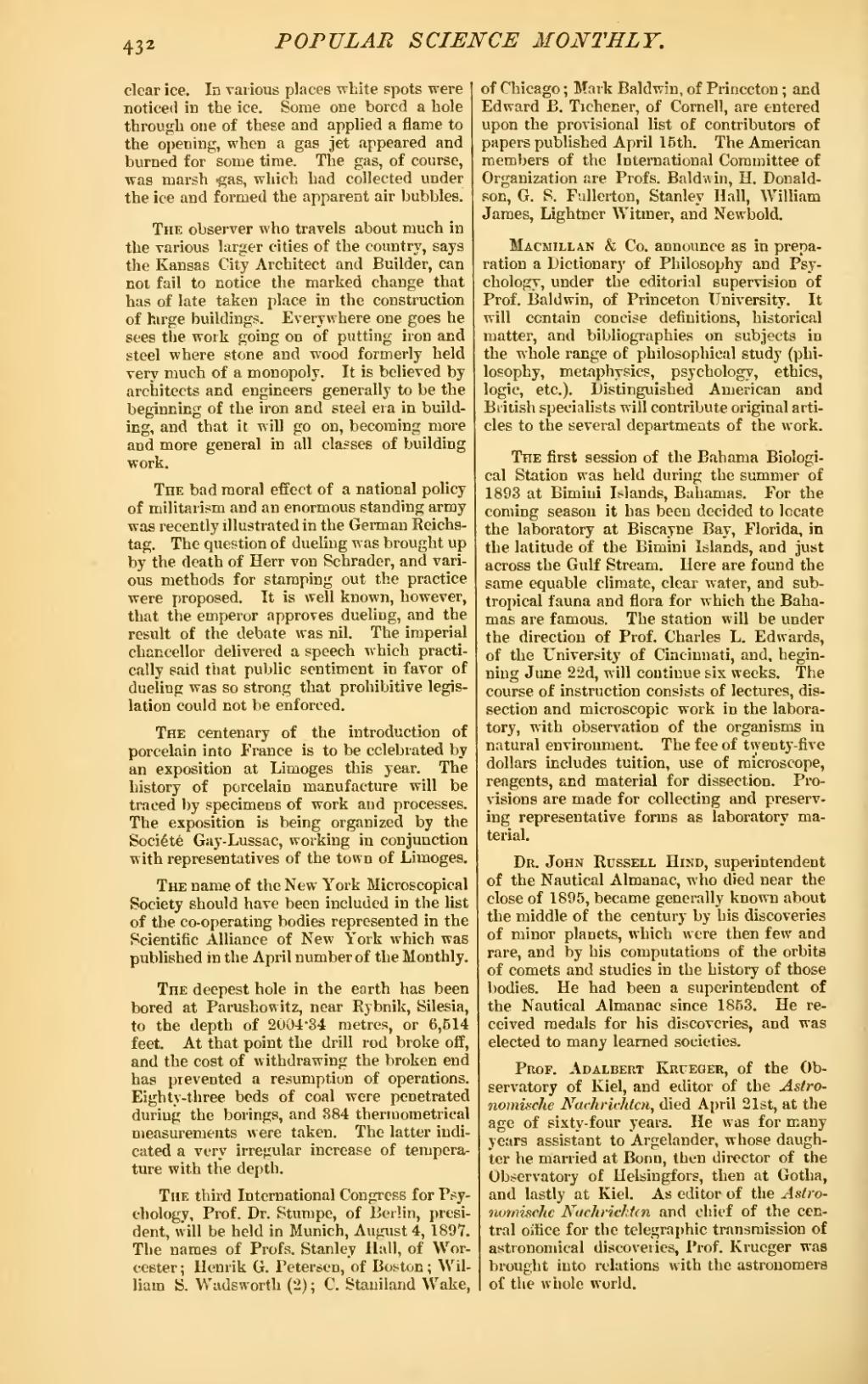clear ice. In various places white spots were noticed in the ice. Some one bored a hole through one of these and applied a flame to the opening, when a gas jet appeared and burned for some time. The gas, of course, was marsh gas, which had collected under the ice and formed the apparent air bubbles.
The observer who travels about much in the various larger cities of the country, says the Kansas City Architect and Builder, can not fail to notice the marked change that has of late taken place in the construction of large buildings. Everywhere one goes he sees the work going on of putting iron and steel where stone and wood formerly held very much of a monopoly. It is believed by architects and engineers generally to be the beginning of the iron and steel era in building, and that it will go on, becoming more and more general in all classes of building work.
The bad moral effect of a national policy of militarism and an enormous standing army was recently illustrated in the German Reichstag. The question of dueling was brought up by the death of Herr von Schrader, and various methods for stamping out the practice were proposed. It is well known, however, that the emperor approves dueling, and the result of the debate was nil. The imperial chancellor delivered a speech which practically said that public sentiment in favor of dueling was so strong that prohibitive legislation could not be enforced.
The centenary of the introduction of porcelain into France is to be celebrated by an exposition at Limoges this year. The history of porcelain manufacture will be traced by specimens of work and processes. The exposition is being organized by the Société Gay-Lussac, working in conjunction with representatives of the town of Limoges.
The name of the New York Microscopical Society should have been included in the list of the co-operating bodies represented in the Scientific Alliance of New York which was published in the April number of the Monthly.
The deepest hole in the earth has been bored at Parushowitz, near Rybnik, Silesia, to the depth of 2004·34 metres, or 6,514 feet. At that point the drill rod broke off, and the cost of withdrawing the broken end has prevented a resumption of operations. Eighty-three beds of coal were penetrated during the borings, and 884 thermometrical measurements were taken. The latter indicated a very irregular increase of temperature with the depth.
The third International Congress for Psychology, Prof. Dr. Stumpe, of Berlin, president, will be held in Munich, August 4, 1897. The names of Profs. Stanley Hall, of Worcester; Henrik G. Petersen, of Boston; William S. Wadsworth (2); C. Staniland Wake, of Chicago; Mark Baldwin, of Princeton; and Edward B. Tichener, of Cornell, are entered upon the provisional list of contributors of papers published April 15th. The American members of the International Committee of Organization are Profs. Baldwin, H. Donaldson, G. S. Fullerton, Stanley Hall, William James, Lightner Witmer, and Newbold.
Macmillan & Co. announce as in preparation a Dictionary of Philosophy and Psychology, under the editorial supervision of Prof. Baldwin, of Princeton University. It will contain concise definitions, historical matter, and bibliographies on subjects in the whole range of philosophical study (philosophy, metaphysics, psychology, ethics, logic, etc.). Distinguished American and British specialists will contribute original articles to the several departments of the work.
The first session of the Bahama Biological Station was held during the summer of 1893 at Bimini Islands, Bahamas. For the coming season it has been decided to locate the laboratory at Biscayne Bay, Florida, in the latitude of the Bimini Islands, and just across the Gulf Stream. Here are found the same equable climate, clear water, and subtropical fauna and flora for which the Bahamas are famous. The station will be under the direction of Prof. Charles L. Edwards, of the University of Cincinnati, and, beginning June 22d, will continue six weeks. The course of instruction consists of lectures, dissection and microscopic work in the laboratory, with observation of the organisms in natural environment. The fee of twenty-five dollars includes tuition, use of microscope, reagents, and material for dissection. Provisions are made for collecting and preserving representative forms as laboratory material.
Dr. John Russell Hind, superintendent of the Nautical Almanac, who died near the close of 1895, became generally known about the middle of the century by his discoveries of minor planets, which were then few and rare, and by his computations of the orbits of comets and studies in the history of those bodies. He had been a superintendent of the Nautical Almanac since 1853. He received medals for his discoveries, and was elected to many learned societies.
Prof. Adalbert Krueger, of the Observatory of Kiel, and editor of the Astronomische Nachrichten, died April 21st, at the age of sixty-four years. He was for many years assistant to Argelander, whose daughter he married at Bonn, then director of the Observatory of Helsingfors, then at Gotha, and lastly at Kiel. As editor of the Astronomische Nachrichten and chief of the central office for the telegraphic transmission of astronomical discoveries, Prof. Krueger was brought into relations with the astronomers of the whole world.

